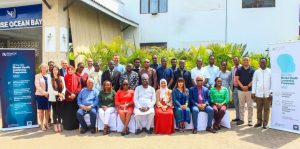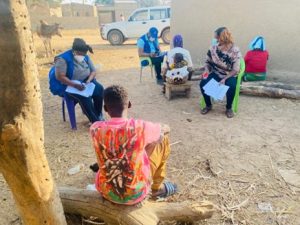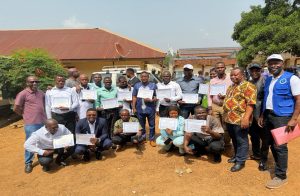Sierra Leone conducts further training on electronic case-based disease surveillance and COVID-19 rapid diagnostic testing
-
by
AFENET
In a bid to improve Sierra Leone’s scores of Joint External Evaluations (JEE) indicators for surveillance, AFENET is supporting the cascading of electronic Case-Based Disease Surveillance (eCBDS) usage and identification of COVID-19 cases using the antigen detection rapid diagnostic test (Ag-RDT).
After three years of significant improvements and gradual scale-up, the nationwide rollout of eCBDS to all public health facilities was completed by mid-2021 to cover both COVID-19 reporting and all other epidemic-prone priority diseases. Since then, over 1,300 public health facilities country-wide are now using the eCBDS for timely reporting of individual-level data of identified cases of priority diseases.
However, it was noted that since the introduction of the COVID-19 RDT nationally, most sentinel sites across the country had not been effectively reporting due to low knowledge in the identification and detection of COVID-19 cases and the use of eCBDS platform.
Reports showed, only 33% of the 98 facilities had reported at least 1 case of COVID-19 RDT in e-CBDS from March 2022. The Western Area Urban (WAU) district particularly had the highest number of facilities reporting COVID-19 RDT usage in eCBDS, while the rest of the districts reported low or no cases which according to the supportive supervision report shows the absence of the screening forms and their non-utilization could account for the low index of clinician suspicion of COVID-19 in the health facilities and, thus, the low testing rate observed.
Previous similar trainings held in 2021 were not sufficient because they covered one staff per health facility. The 2023 training therefore covered more staff. making a total of 630 (47 district staff, 12 national staff, and 571 health facility staff). The training targeted health facility staff who had never received the training due to transfers and attrition.
The rapid case detection helps decision makers to detect, identify clusters of infection to understand the magnitude of the condition and be able to effectively plan and respond to mitigate the spread of infection.
Trainee reflections
“About 90% of the participants trained, were able to use the training app to report a case.” – Mr. Abdul Karim Sesay, Data Manager-Directorate of Health Security and Emergencies.
“With the skills acquired during the training, I am confident to use COVID-19 Ag-RDT to diagnose patients.” – Fatmata Coker, Community Health Officer (CHO) – Tombo CHC, WAR district



